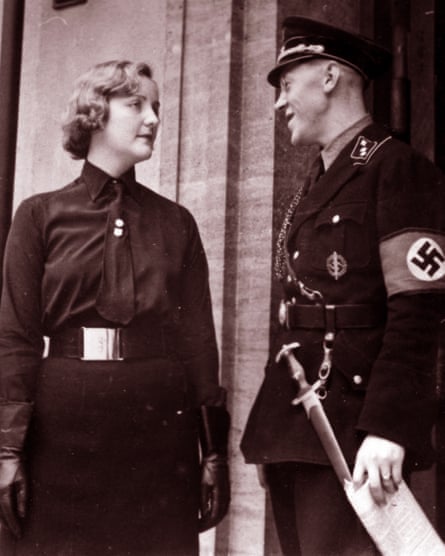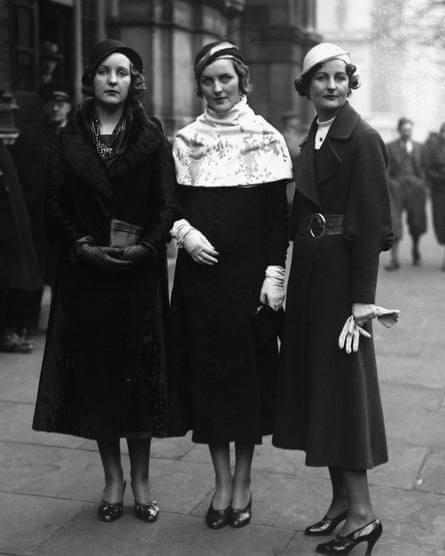Myths and suspicions have swirled around Unity Mitford ever since she decided to move to Munich to pursue her infatuation with Adolf Hitler. Were they lovers? Did she have his baby? Why was MI5 forbidden from speaking to her when she returned to Britain?
Now, after extracts from the socialite’s diaries were published on Saturday , censorship campaigners and authors say the gatekeepers of Britain’s official archives should end their increasingly secretive approach to historical documents.
Pictures of a black, leather-bound book were printed by the Daily Mail yesterday, alongside images of tight handwriting of what the newspaper assured readers was Mitford’s diary, filled with antisemitic bile and teenage froth.
The paper was at pains to distinguish its scoop from the infamous Hitler diaries hoax that embarrassed the Sunday Times in 1983. Andrew Roberts, the distinguished royal historian, pronounced them “undoubtedly genuine”, as did David Pryce-Jones, whose biography of Mitford in 1976 provoked outrage from her sisters.
Mitford and her five sisters were the most talked-about debutantes on the social scene in inter-war Britain, and the talking has never stopped. Biographies, plays and television dramas have portrayed the scandals involving the six daughters of Lord Redesdale, a cousin of Churchill’s wife Clementine.

Unity Mitford apparently kept a diary of her time in Germany from 1935 to 1939, and – according to the Daily Mail – recounts 139 occasions when she met Hitler, how he kissed her hand or stayed up talking to 3am. It also charts her unrelenting antisemitism and how she learned how to use a pistol saying: “I am practising to kill Jews.”
“If this hadn’t been found, an important contribution to history would have been lost,” said Andrew Lownie, whose 2021 biography of Edward VIII, The Traitor King, details his abdication, his links to Nazi Germany, and Churchill’s attempts to prevent publication of German documents revealing the extent of the Duke’s ties with Hitler.
That instinctive secrecy on the part of the British state continues to the present day.
“The irony is that often the breakthroughs in historical knowledge come from private papers rather than public papers, and that’s because they’re being suppressed,” he told the Observer.
“Who knows what is lurking in bank vaults all over the world? It should be a rallying call for historians to fight for stuff being released. We have a Public Records Act going back to the 1830s which isn’t really being obeyed.
“Stuff isn’t being put into the archives after 20 years. They’re using all sorts of exemptions which don’t really apply. But everyone from that period is dead. This is history, and we need to know our history.”
A historical episode obscured by official secrecy involves the attempts by British fascists to overthrow Churchill in 1940.
“There remain a large number of files on very well-connected British fascists, aristocrats, politicians, particularly the House of Lords, whose files have mysteriously never been released,” said Tim Tate, author of Hitler’s British Traitors. “And I know they exist because I have the file numbers. They should be in the National Archives, but aren’t.”
One of three coup attempts uncovered by Tate include plans by Leigh Vaughan Henry.
“[He] was a celebrated musicologist and conducted orchestral performances for the royal family,” Tate said. “His MI5 files are missing.” Index on Censorship, which has campaigned on the issue of royal secrecy, also believes the Mitford diaries demonstrate the need for openness.
John McDonnell, the former shadow chancellor, said: “The culture of secrecy in this country is a bizarre anachronism when it comes to protecting the establishment even as far back as the last century.”

Richard Norton-Taylor, a leading writer on defence and security issues and author of The State of Secrecy, said: “The government must now reveal what its officials, intelligence and security agencies really knew about the activities of Unity Mitford. Judging by the number of files they amassed on private individuals in the lead-up to the second world war it would be extremely surprising if official files on her and her relationships do not exist.”
He pointed out that the government has recently been more open about data secretly collected on figures from the left of politics, such as the former Labour leader Michael Foot.
Mitford shot herself in the head at the outbreak of the war, and was brought back to Britain by her father. In 2002, the Observer revealed that Guy Liddell, who worked in counter-espionage, had tried to interview her but had been prevented from doing so by government ministers.
The effects of her head injury meant that Mitford was accompanied, although intelligence officers believed she had been “consorting with” an RAF test pilot. There were rumours she had had baby.
Her sisters were almost as notorious. The most infamous in her own lifetime was Diana Mitford, also often judged the most eligible and ambitious of the sisters. In 1929 she married Bryan Guinness, 2nd Baron Moyne and the heir to the drinks fortune, and appeared set for a life as a society hostess. But she soon left her husband for the far-right leader of the British fascist party Sir Oswald Mosley. In the run-up to the Second World War both were interned, suspected of sympathising with the Nazi regime and posing a threat to public order.

 3 months ago
57
3 months ago
57













































